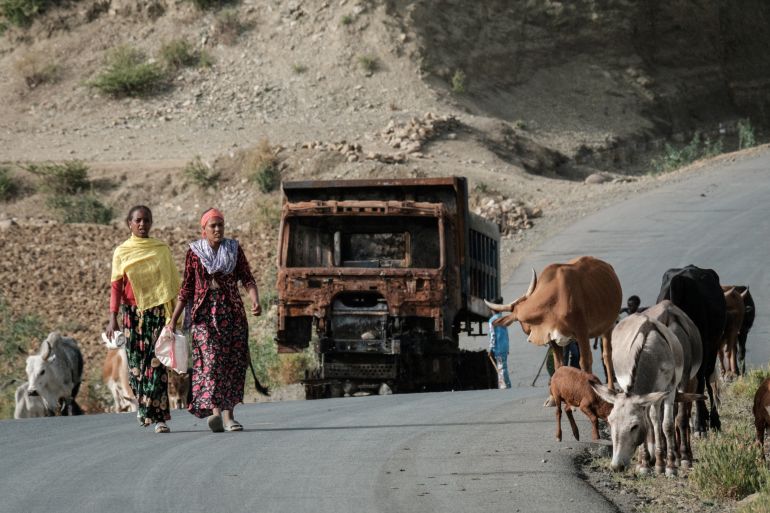Amnesty: Rape survivors describe slavery, mutilations in Tigray
‘Severity and scale’ of sexual crimes committed by Ethiopian and Eritrean troops amount to war crimes, the rights group says.

Ethiopian and Eritrean troops have raped hundreds of women and girls during the Tigray war, subjecting some to sexual slavery and mutilation, human rights group Amnesty International has said in a 36-page report.
Drawing from interviews with 63 survivors, the report (PDF) published on Wednesday sheds new light on a scourge already being investigated by Ethiopian law enforcement officials, with at least three soldiers convicted and 25 others charged.
Keep reading
list of 4 itemsEritrean refugees rally against ‘dire situation’ in Tigray camps
Ethiopian parents living in agony as students stranded in Tigray
Photos: Grim pictures from Tigray show brutality of war
Some survivors said they had been gang raped while held captive for weeks on end. Others described being raped in front of their family members.
Some reported having objects including nails and gravel inserted into their vaginas, “causing lasting and possibly irreparable damage,” Amnesty said.
“It’s clear that rape and sexual violence have been used as a weapon of war to inflict lasting physical and psychological damage on women and girls in Tigray,” said Amnesty’s Secretary General Agnes Callamard.
“Hundreds have been subjected to brutal treatment aimed at degrading and dehumanising them.
“The severity and scale of the sexual crimes committed are particularly shocking, amounting to war crimes and possible crimes against humanity.”
‘All of us were raped’
Northern Ethiopia has been racked by violence since November after Prime Minister Abiy Ahmed, the 2019 Nobel Peace Prize winner, sent troops into Tigray to topple its regional ruling party, the Tigray People’s Liberation Front (TPLF).
He said the move came in response to TPLF’s attacks on federal army camps.
As the conflict deepened, the humanitarian toll spiked, with aid workers struggling to reach populations that were now unreachable. Currently, 400,000 people are facing famine-like conditions in Tigray, according to the United Nations.
Alleged perpetrators of rape include government soldiers, troops from neighbouring Eritrea – which has backed Abiy – as well as security forces and militia fighters from Ethiopia’s Amhara region, Amnesty said.
More than 12 survivors told Amnesty they were raped by Eritreans only, while others said Eritreans and Ethiopians had worked together.
“They raped us and starved us. There were too many who raped us in rounds,” said one 21-year-old survivor who reported being held for 40 days.
“We were around 30 women they took … All of us were raped.”
Acts of sexual violence were widespread and intended to instil fear and “humiliate” the victims and their ethnic group, Amnesty noted.
Soldiers and militia frequently used “ethnic slurs, insults, threats, and degrading comments”, the group said. Several survivors said that their rapists had told them, “This is what you deserve” and “You are disgusting”.
Investigations ongoing
The AFP news agency had previously interviewed multiple survivors of gang rape perpetrated by Ethiopian and Eritrean soldiers.
Amnesty on Wednesday said health facilities in Tigray had “registered 1,288 cases of gender-based violence from February to April 2021”, although doctors note that many survivors do not come forward.
Survivors still suffer significant physical and mental health complications, Amnesty said.
While many complained of physical trauma such as “continued bleeding, back pain, immobility and fistula”, others tested positive for HIV after being raped, the group said.
In February Ethiopia’s women’s minister Filsan Abdullahi Ahmed said rape had “without a doubt” taken place in Tigray. A task force she established has since sent a report to the attorney general’s office.
On Tuesday, Filsan told AFP it was up to law enforcement officials to determine the scale of the problem and who was responsible.
“I think they are doing their best … They have to go and really study thoroughly before they identify who committed the crimes.”
But she added: “I would prefer them moving at a faster pace so I can say justice has been served, and I hope we will see justice being served.”
In May, the attorney general’s office said three soldiers had been convicted and sentenced for rape and that an additional 25 personnel had been charged with “committing acts of sexual violence and rape”.
Investigations were continuing, it said.